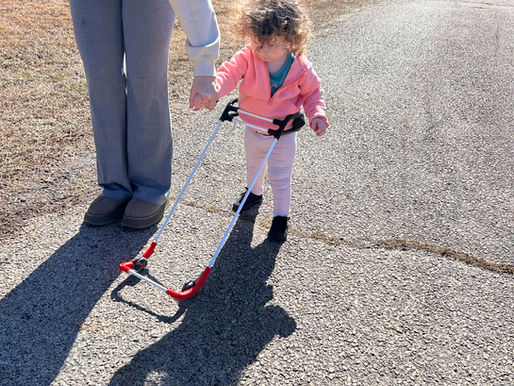top of page
Blog


It’s Never Too Late: How the Pediatric Belt Cane Unlocks Walking Confidence for Children with an MVI/B
At approximately 12 months, the eyes of sighted children have physically developed to adult proportions. This shift allows vision to become the dominant source of balance feedback for walking. The Pediatric Belt Cane provides what the developing MVI/B body needs: enhanced tactile feedback.

Grace Ambrose-Zaken
8 hours ago


Who Is Advocating for the Quiet Blind Child?
Allow blind children to wear the Pediatric Belt Cane—a mobility solution that extends touch feedback at the moment it is needed most, during early walking.
Allow them to move independently now, not someday.
Allow them to build balance through information, not fear.
Allow them to walk safely until they are old enough to speak for themselves and advocate for a long cane.

Grace Ambrose-Zaken
Feb 1


Understanding Blind Walking: How Extended Touch Enables Balanced Walking
Mobility tools (Belt Cane, rectangular cane, long cane, and human guide) all share a common feature, they provide body-to-device-to-surface link. They allow the blind person to touch the ground ahead this additional sensory information helps stabilize walking in much the same way vision does. When a cane touches the ground, it sends signals to the brain about the surface and body position, acting as an extension of the sensory system.

Grace Ambrose-Zaken
Jan 28


The Belt Cane Balance Advantage: The Walking Solution Parents Have Been Looking For
Clinical Ophthalmology published an article called The Role of a Pediatric Belt Cane in Children with Cerebral Visual Impairment a pilot study that used smartphone videos from 11 children with clinical diagnosed CVI at baseline and 8-week follow-up while wearing a Pediatric Belt Cane. Belt Cane use was associated with improved gait speed, with supportive improvements in step length and foot-mobility. That's because bipedal ambulation (walking) is not possible without unaltere

Grace Ambrose-Zaken
Jan 23


Why Pediatric Belt Canes Improve Child Mobility: A Pediatric Mobility Aid Guide
When a child faces challenges with mobility due to visual impairment or blindness, every step can feel like a mountain to climb. But what if there was a way to make those steps easier, safer, and more confident? That’s where pediatric mobility aids come into play. Among these, the Belt Cane stands out as a remarkable tool that can transform a child’s independence and daily life. Let’s explore why Pediatric Belt Canes improve child mobility and how they can make a real differ
Beaux Jettson
Jan 22


Discover How Pediatric Belt Canes Transform Mobility
Mobility tools for children with a visual impairment are specially designed to meet their unique needs. Unlike adults, children require devices that are lightweight, easy to handle, and adaptable to their smaller frames. The pediatric mobility tool category includes various aids, but the Belt Cane has gained attention for its practical benefits.

Grace Ambrose-Zaken
Jan 8


Celebrating Generosity: Ovintiv's Impact on Children with Visual Impairments
At Safe Toddles, we often find that the most meaningful support begins with a story. Today, we want to share one such story and express our deep gratitude to Ovintiv USA Inc. for their generous $5,000 donation through the 5 for a Cause employee giving initiative. This gift is more than financial support—it is a powerful reminder of how compassion and community can open doors for children with unique challenges.

Grace Ambrose-Zaken
Dec 23, 2025


Dr. Grace Ambrose-Zaken to Discuss the Pediatric Belt Cane on Eye On Vision
Dr. Grace Ambrose-Zaken was interviewed by Stephen Usery for an upcoming episode on the radio program Eye On Vision. The episode is scheduled to air at approximately 12:15 PM Eastern on Sunday, December 28, 2025, on FM 89.3 WYPL in Memphis. To catch this insightful interview, tune in to FM 89.3 WYPL on Sunday, December 28, 2025, at about 12:15 PM Eastern. If you are outside the Memphis area or prefer online listening, the station streams live at http://memphislibary.org/wypl
Beaux Jettson
Dec 22, 2025


Supporting Mobility with Pediatric Belt Cane
A Pediatric Belt Cane is designed specifically for children who need assistance with mobility. Unlike traditional canes, which can be cumbersome or difficult for small hands to manage, the Pediatric Belt Cane offers a hands-free solution. It wraps securely around the child’s waist, allowing the cane frame to be attached and easily accessible without the child having to hold it constantly.

Grace Ambrose-Zaken
Dec 18, 2025


How a Pediatric Mobility Cane Enhances Independence and Safety
Mobility challenges can feel daunting, but with the right tools and support, children can thrive. The Pediatric Belt Cane is more than a device - it’s a key to unlocking a world of possibilities. So, why wait? Explore options, seek professional advice, and watch your child take confident strides toward independence.

Grace Ambrose-Zaken
Dec 14, 2025


Empowering Mobility with Pediatric Mobility Aids: A Guide to Belt Canes and More
When a child faces challenges with vision, mobility becomes a crucial part of their independence and confidence. Pediatric mobility aids are designed to support children in navigating their world safely and effectively. These tools are not just devices; they are bridges to freedom, exploration, and self-reliance. Today, I want to share insights about one such essential aid and the broader landscape of pediatric mobility aids that empower young lives.

Grace Ambrose-Zaken
Dec 11, 2025


Why Pediatric Belt Canes Improve Mobility: A Guide to Pediatric Mobility Aids
When it comes to helping children with visual impairments navigate the world safely and confidently, the right tools make all the difference. Pediatric mobility aids are designed specifically to meet the unique needs of young users. Among these aids, one stands out for its practicality and effectiveness: the pediatric belt cane. This tool is more than just a cane; it’s a bridge to independence, safety, and confidence for children learning to move through their environment.

Grace Ambrose-Zaken
Dec 1, 2025


Thankful for Pediatric Belt Canes Supporting Early Mobility
Mobility tools for children with visual impairments or blindness are tailored to their unique needs. Unlike adult devices, pediatric tools consider size, weight, and the developmental stage of the child. The Pediatric Belt Cane is a perfect example. It’s lightweight, easy to handle, and designed for children.

Grace Ambrose-Zaken
Nov 28, 2025


The Benefits of Pediatric Belt Canes
Safety is paramount when it comes to overseeing the education and play of young children. The Pediatric Belt Cane plays a crucial role in reducing risks associated with immature cane handling. When a cane is dropped or misplaced, the child may be vulnerable to tripping or losing orientation. The belt eliminates these hazards by keeping the cane firmly attached.

Grace Ambrose-Zaken
Nov 24, 2025


Join Us Tomorrow for Celebrating Innovation Pediatric Belt Canes for children with deafblindness
This event will provide an in-depth look at the Pediatric Belt Cane and its role in supporting DeafBlind toddlers. Attendees will hear from Dr. Grace Ambrose-Zaken the renown inventor of the belt cane and expert in orientation and mobility, learn about the research outcomes of the belt cane, and see real-life video examples of how it improves motor and developmental outcomes in children with deafblindness.
Beaux Jettson
Nov 17, 2025


Enhancing Mobility for Visually Impaired Children with Belt Canes
Mobility tools for vision impaired children are designed to help them detect obstacles, understand their environment, and move safely. These tools range from traditional long canes to more innovative devices like the belt cane. Each tool has its unique benefits and applications.

Grace Ambrose-Zaken
Nov 3, 2025


🌟 White Cane Day Has New Meaning for the Youngest Explorers
White Cane Day has new meaning for children who are blind from birth. With the Pediatric Belt Cane and Rectangular AMD, even toddlers can now join the celebration — walking safely and independently using touch for balance, protection, and exploration.

Grace Ambrose-Zaken
Oct 13, 2025


The William G. and Helen C. Hoffman Foundation Renews Support for Safe Toddles with a $30,000 Grant to Advance Early Mobility for Blind Children
Safe Toddles receives a $30,000 grant from the William G. and Helen C. Hoffman Foundation—their second year of support—to expand early mobility access for blind children through Pediatric Belt Canes, training, and family outreach.
Beaux Jettson
Oct 10, 2025


🧭 Navigating with Confidence: The Role of Pediatric Belt Canes in Empowering Children with Visual Impairments
Children begin learning to navigate their world from the moment they start moving. For children with blindness or mobility-related visual impairments, this process can be more complex — but no less vital.
Traditional mobility tools like long canes often aren’t introduced until school age, which can delay critical stages of physical and cognitive development. The Pediatric Belt Cane, however, provides the tactile input needed to safely begin independent movement as early as 1

Grace Ambrose-Zaken
Sep 17, 2025


1960s Part 2: O&M Goes to School
The entire field of orientation and mobility (O&M) exists because of the dog guide and, later, the long cane. Both were developed in response to war. Dog guides emerged after World War I, and the long cane after World War II, to serve newly blinded veterans—adults who had walked confidently with vision for decades before losing it. As a result, the curriculum for teaching independent travel was designed around a very specific learner: a physically fit, cognitively intact adul

Grace Ambrose-Zaken
Apr 6, 2025
bottom of page
